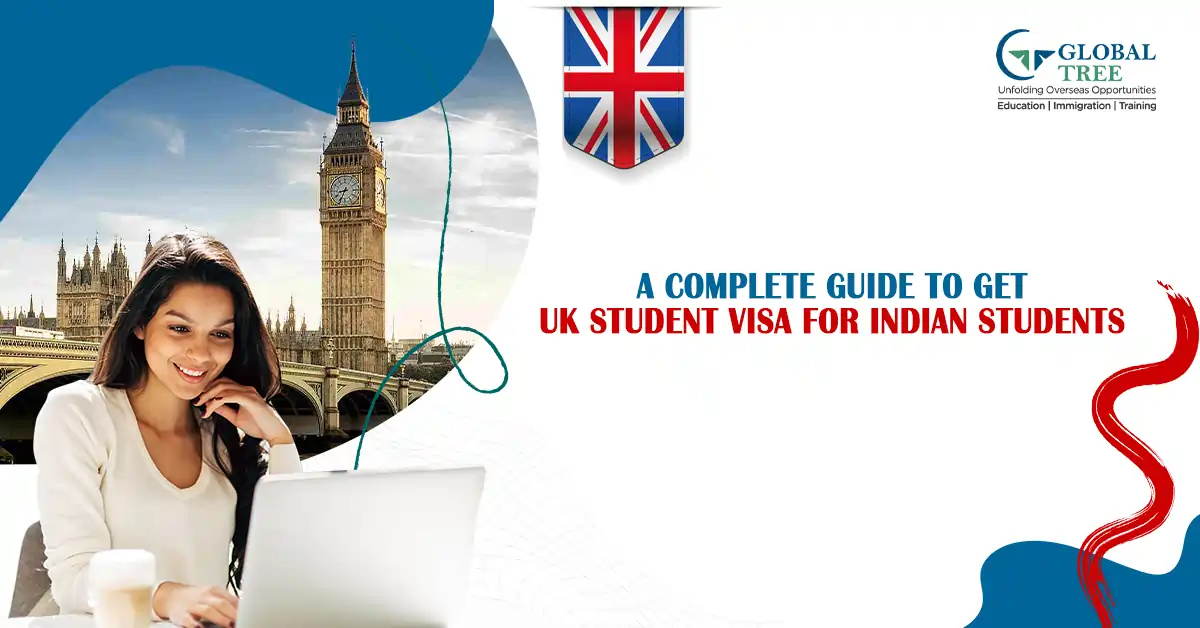A Complete Guide to Get UK Student Visa for Indian Students

- FAQs- Frequently Asked Questions for UK Student Visa
- Introduction
- What is a UK Student Visa?
- What are the Tiers in UK Visa?
- What is a UK Tier 4 Visa?
- What is CAS or Certificate of Acceptance of Studies for a UK Visa?
- CAS Statement
- What does the CAS Statement contain?
- What are the UK student visa benefits for an International Student?
- Limitations of a UK Student Visa for an International Student
- Am I Eligible for UK Visa for Students?
- Minimum IELTS Score for UK Student Visa
- UK Student Visa Document Checklist
- Academic Technology Approval Scheme (ATAS)
- UK Student Visa Financial Requirements
- What is the UK Study Visa Process for International Students?
- UK Student Visa and Term Breaks
- Where to apply for UK Student Visa?
- What is the UK Embassy Fee for Student Visa for an International Student?
- What is the Student Visa Fees for UK from India? (Indian Rupees)
- What is the UK Student Visa Duration of Stay?
- What is the UK Student Visa Validity?
- What is the UK Visa Expiration Date?
- What is the UK Student Visa Wait Time from India?
- Is Gap Acceptable for UK Study Visa?
- What is the passport validity for UK Student Visa?
- What is the UK Student Visa Success Rate 2023?
- What is the UK Student Visa Rejection Rate 2023?
- Which countries can I Travel with a UK Student Visa?
- Can I Travel Internationally on a UK Student Visa?
FAQs- Frequently Asked Questions for UK Student Visa
What are the main reasons for UK student visa rejection?
There are numerous reasons why the immigration office may reject your UK student visa application:
Missing documents
inaccurate information
More at: Unfolding 7 Reasons for UK Student Visa Rejections: Why Applications Get Denied
Introduction
“Are you over 16 and ready for the world?
Or Is your pay after a bachelors enough?”
The UK definitely tops the list of top countries to study as an International student. It has a world class reputation & is home to some of the old universities for our time. It has its roots back to 12th and 13th centuries.
Some of the UK universities have proved to be an exemplary example for other countries and their educational sector.
The number of international applicants in UK universities also see a never seen before increase, especially in India. In the year 2022, 770,000 went to the UK for their studies. This was the highest number of international students of a country to be admitted to UK universities.
The average rate of growth trends to 10 % every year.
What is a UK Student Visa?
The first thing to understand is- ‘What is a Tier 4 Visa?’
UK typically provides 3 types of visa. These are differentiated on the basis of the duration of your studies in UK.
- Short-term Study Visa: A Short-term UK Study Visa issued to people who wish to study aEnglish language course for up to 11 months.
- Student Visa or Tier 4 Visa (General) : This visa category is for students coming to the UK for higher education. It was formerly termed as a Tier 4 (General) Student Visa, popularly called a Tier 4 Student Visa.
- Child Student Visa or Tier 4 Visa (Child) : This visa is for children who are between 4 and 17 years and wish to study at an independent school in the UK. Previously known as Tier 4 (Child) Student Visa.
What are the Tiers in UK Visa?
Tier 1: High-Value Migrants
Tier 2: Skilled Workers
Tier 3: Unskilled Workers
Tier 4: Adult Students
Tier 5: Temporary Workers
What is a UK Tier 4 Visa?
If you're an international student who wants to study in the UK, a Tier 4 visa will be necessary.
Anyone above the age of 16 is eligible to apply.
It is intended for adults who have been offered a course by a licensed student sponsoring organisation, have the means to support their education, and have good command of the English language.
Children between the ages of 4 and 17 may also study in the UK using Tier 4.
Part-time employment is authorised for students with Tier 4 visa applications in the UK. You may work up to 20 hours per week on your Tier 4 visa if your college is one of the recognized higher educational institutions in the UK.
Once you apply to your chosen university, and you receive an unconditional offer, The university will give you a “Certificate of Acceptance of Studies” or simply CAS.
What is CAS or Certificate of Acceptance of Studies for a UK Visa?
Confirmation of Acceptance for Studies (CAS) is issued after you have accepted the admission offer and paid the sum to confirm your seat.
This letter contains overall information of your details, the course, duration and a very useful CAS Number. This number is required by the UK Immigration. This is a confirmation of acceptance by a UK university and that you have confirmed it.
You will only receive it after your eligibility is completely checked and verified.
This Certificate of Acceptance of Studies (CAS) is valid for 6 months.
Some Universities also send this CAS number to you, or else you need to apply to receive this number.
Along with your CAS, your institution will also send a special reference number.
This reference number must be listed on the Tier 4 visa application form.
This number and any supporting documentation will be checked by the visa official handling your application to ensure that you have received an unconditional offer from the university.
CAS Statement
Additionally, your college will give the data they used to create your CAS. You will receive an email with what is known as a "CAS statement."
The CAS statement itself is not mandatory while you are applying for the student visa. But it contains all the details about your course, your sponsor, and some information regarding the money you will need to submit your Tier 4 visa application
Your visa application may be rejected if there are any variations between the data the university generated for the CAS and the data you provide on your application form.
What does the CAS Statement contain?
- 14-digit reference number for the CAS
- Sponsor Licence Number (SLN) of the university where you intend to study
- Sponsor Licence Address
- Qualifications which helped you secure a place in the university
- Start and end dates of your course
- Passport number and your name on your passport
- Title of the course
- Tuition fees for the first year or the entire course.
- Any tuition fees that you have already paid to the university
- Any accommodation fees that you have already paid
- Test Assessment of your English language ability i.e. IELTS or TOEFL scores
What are the UK student visa benefits for an International Student?
A student visa in the UK has several advantages, among them:
- Academic excellence- Most UK universities come under the Top 10 Universities in the world.
- Shorter duration of courses
- The liberty to work and study - you're allowed to work up to 20 hours per week during term time and full-time during university holidays.
- Health care and other public services are available - free prescriptions, dental, and eye care through the National Health Service.
- Access to free education and tuition fees - You'll also get discounts on books, cultural attractions and other services
- Applying for work permits - which can help you gain valuable work experience
- Access to scholarships and grants that can help cover tuition, living expenses and other fees.
- Access to English language classes and other support services.
- Access to universities and colleges across the UK with high-quality courses and degrees.
Limitations of a UK Student Visa for an International Student
Restrictions on a Student Visa Include:
- Being self-employed or part of business discussions or enterprise
- Working in a full-time permanent position
- Working as a professional sportsperson, coach or entertainer
- Working as a doctor or dentist in training
- Working in a graduate-level role (unless it’s as a student union staff member)
Am I Eligible for UK Visa for Students?
- You should have an offer of a full-time academic course from a recognised UK university.
- Sufficient financial resources for the duration of the course.
- English language proficiency.
- Consent from your parents or guardian if you are 16-17 years of age
- Here is the complete eligibility criteria in UK
Minimum IELTS Score for UK Student Visa
For a UK student visa, an overall IELTS score of 4.0 or above in all four bands is required.
- Foundational Programme - The IELTS score requirement is overall 4.5 with not less than 4 in any band.
- Bachelor's Programme - The minimum IELTS score requirements is overall 6 with not less than 5.5 in any band.
- Masters Programme - The minimum IELTS score calculated for the UK is overall 6.5 or 6 depending upon your university, with not less than 6 in any band.
UK Student Visa Document Checklist
- Valid passport or other acceptable form of documentation.
- Proof of sufficient finances to cover your living expenses for the duration of the course.
- Confirmation of Acceptance for Studies (CAS) reference number and papers required to get CAS.
- Color passport sized photos.
- Tuberculosis testing (required in South Asian nations).
- Academic Technology Approval Scheme (ATAS) clearance certificate (if needed).
Academic Technology Approval Scheme (ATAS)
ATAS applies to all international students and researchers (apart from exempt nationalities) who are subject to UK immigration control and are intending to study or research at postgraduate level in certain sensitive subjects.
These subjects include:
- Advanced Conventional Military Technology (ACMT)
- Weapons of mass destruction (WMDs
- Any means of delivery.
Researchers and students in these sensitive subjects must apply for an Academic Technology Approval Scheme (ATAS) certificate before they can study or start research in the UK.
Simple Tips to keep in mind for your UK Visa
UK Student Visa Financial Requirements
As a Student you usually need to show a certain amount of money for the duration of your course.
Here is a list of factors help you decide the amount of money you need to show in order for the visa to get approved:
- Your confirmation of acceptance for study (CAS), which will also list the titan fee for the course.
- Your education provider will send you the CAS once they have offered you a place on a course.
- Whether you have already paid a fee to your sponsor.
- What sort of student permission you are looking for, or the length of your course,
- your education provider will send you the CAS once they have offered you a place.
- You need to show the area you are staying since the cost of living is different in every locality.
- If you have already paid your education sponsor for any accommodation, up to £1,334 can be deducted from the funds that you need to submit.
- Mention about your living arrangements, if you are aged under 18.
- If you are allowed to bring dependents (your partner or children) you will also need to show you have enough money to cover their living costs.
What is the Cost of Living in UK?
What is the UK Study Visa Process for International Students?
Follow this step-by-step guide to applying for your student visa:
Step 1: Apply to your selected University and hope to receive with an unconditional offer letter.
Step 2: Your institution will issue you a certificate known as a Certificate of Acceptance of Studies (or CAS) once you have accepted your unconditional offer.
Step 3: The procedure for applying for a visa can start after you have your CAS. You have up to six months before the commencement of your study to apply for a UK visa. You must have a valid passport and pay the application fee (£363 for students).
Step 4: You must include a fee known as an Immigration Health Surcharge with your application. You now have access to the National Health Service of the UK. Students pay 25% less than the standard rate, making the annual fee for those with student visas £470.
Step 5: You could be required to provide evidence of your proficiency in the English language as part of your student visa application. Verify with your university what kind of English language proof they will want as different universities have different standards.
Step 6: Before travelling to the UK, you must submit your application and get it approved.
UK Student Visa and Term Breaks
The term break rules for a UK Student Visa are as follows:
- During term time, you can work up to 20 hours per week if your course of study is at degree level or above. If your course of study is below degree level, you can work a maximum of 10 hours per week.
- You are considered to be in term time all year unless you have written permission from your supervisor to take a period of annual leave.
- Any annual leave must be agreed by your supervisor.
- During this annual leave, you can work full-time jobs and internships in UK.
Please note that these rules are subject to change and it’s always best to check the latest information from the official UK government website. Also, remember that there are many restrictions and conditions you must stay in line with in order to be allowed to work
Where to apply for UK Student Visa?
You can apply for a UK Student Visa in India online through the official Gov.UK website. The application can be done online, or you can print and sign your application form and submit all your documents to the nearest UK visa centre in India.
You can apply up to 6 months before your intended date of travel to the UK. Remember, your application date is the date when your application fee is paid.
For payment, you have several options:
- Online using either a MasterCard or Visa card.
- Through demand draft at the visa application centre and selected branches of Standard Chartered Bank.
- Through Cash at the visa application centre and selected branches of Standard Chartered Bank.
- Please note that these rules are subject to change and it’s always best to check the latest information from the official UK government website.
As for the Locations of UK embassies in India, here are some of them:
- British High Commission New Delhi: Shantipath, Chanakyapuri, New Delhi 110021
- British Deputy High Commission Chennai: Gemini Circle, Chennai 600 006
- British Deputy High Commission Hyderabad: 2nd Floor, Taj Deccan Hotel, Road No.1, Banjara Hills, Hyderabad, Telangana 500034
- British Deputy High Commission Kolkata: 5/1, Ho Chi Minh Sarani, Kolkata - 700071, West Bengal
- British Deputy High Commission Mumbai: C-49, G-Block, Bandra Kurla Complex Bandra East, Mumbai 400051
- You can also submit your UK visa application in Ahmedabad, Bengaluru, Chandigarh, Chennai, Cochin and Goa.
(Read More: How does the UKs Education System work?)
What is the UK Embassy Fee for Student Visa for an International Student?
The fee for the UK Student Visa (formerly Tier 4 (General) Student Visa) is £363 if you are applying from outside the UK.
If you are applying from inside the UK, the fee is £4901.
Please note that in addition to the visa fee, you also have to pay a healthcare surcharge, which depends on the duration of your stay.
What is the Student Visa Fees for UK from India? (Indian Rupees)
Here is the fee structure for a UK Student Visa from India:
| Fee Type | Amount (in GBP) | Amount (in INR) |
|---|---|---|
|
Application Fee |
£363 |
37,000 |
|
Application Fee (if applying from inside the UK) |
£490 |
50,000 |
Please note that these fees are non-refundable and are required to be paid to have your application processed. It’s always best to check the latest information from the official UK government website.
What is the UK Student Visa Duration of Stay?
The duration of stay on a UK Student Visa depends on the level of your course and what study you’ve already completed in the UK. If you’re 18 or over:
For courses at degree level or above, you can usually stay in the UK for up to 5 years.
For courses below degree level, you can usually stay in the UK for up to 2 years.
How to Study in UK after 12th?
What is the UK Student Visa Validity?
A Tier 4 (General) Student visa's validity period is determined by how long your course will last.
The visa is valid for the duration of your studies, up to six months in the case of shorter courses. The visa normally lasts for up to 5 years, or until your course is finished, whichever comes first, for individuals taking lengthier courses.
You can often stay in the UK for up to 5 years if you are 18 or older and enrolled in a degree-level course. You can normally stay in the UK for up to 2 years if it's below the degree level.
Usually the visa lasts up to 5 years or it may last until your course duration is completed. Whichever happens first for the people taking long duration courses.
What is the UK Visa Expiration Date?
The expiration of a UK Student Visa depends on the length of your course and what study you’ve already completed in the UK.
- If you’re 18 or over and your course is at degree level, you can usually stay in the UK for up to 5 years.
- If it’s below degree level, you can usually stay in the UK for up to 2 years.
- You must apply to extend your visa before your current visa expires. Your new course must begin within 28 days of your current visa expiring. For example, if your visa expires on 1 December, you must apply for a new visa before 1 December.
- Your new course must begin by 29 December.
Please note that you must leave the UK by the expiry date of your visa unless you have submitted a visa application to extend your permission in the UK; there is no ‘grace period’ following the expiry date of your visa.
For more specific information, please refer to the official UK government website or consult with a legal expert.
(Read More: Top Computer Science Universities in UK)
What is the UK Student Visa Wait Time from India?
The processing time for a UK Student Visa from India is typically around 3 weeks. However, it can take up to 3 months in some cases. If there are no major issues with your application, the processing can be done within 15-20 days.
Please note that these are approximate times and actual processing times can vary. You should allow enough time before you plan to travel to make a visa application.
You may also opt for a priority service, where the UK Visa decisions will be made 5 days after your interview, or the super priority service which offers next-day collection. For more specific information, please refer to the official UK government website or consult with a legal expert.
Is Gap Acceptable for UK Study Visa?
Yes, a study gap is generally acceptable for a UK Study Visa. The UK is known for its study gap acceptable universities. Here are the details:
Undergraduate and Diploma Students: A study gap of up to 2 years is generally acceptable. Some universities in the UK allow aspirants to pursue undergraduate courses despite a study gap of three years. If you can substantiate your cause of the year gap with valid reasons, then you will find many universities, which accept the applications of applicants who have a study gap of five years.
Postgraduate Students: A study gap of up to 5 years is generally acceptable. If you want to study in the UK, but have a study gap of five years immediately after your bachelor’s degree, you can still apply to any of the UK universities.
In Some Cases: There is an 8-year study gap available in various institutions and universities. There would be no difficulty in getting a study visa after an 8 years gap, if you were excellent in your studies and had a solid record before the gap.
Please note that these are general guidelines and the exact requirements may vary. It’s always best to check with the specific university or institute you’re applying to, or consult with an industry expert for more specific information. You can also check out How to make the most out of a Gap Year?
What is the passport validity for UK Student Visa?
When you apply for your UK Student visa, you must provide a current passport or other valid travel documentation.
To study abroad, ideally, your passport should still have at least 6 months validity when you return to the UK.
You also need a blank page in your passport for your visa if you need to give your biometric information (fingerprints and a photograph) at a visa application centre.
What is the UK Student Visa Success Rate 2023?
The UK student visa success rate in 2023 for Indians is high.
According to reports published in 2022, the UK student visa success rate in India was 95% .
For the year ending March 2023, there were 477,931 sponsored study visas granted by the UK government of which 30 per cent went to Indians.
(Read More: Student Reviews and Testimonials you’d want to take a look at!)
What is the UK Student Visa Rejection Rate 2023?
The rejection rate was only slightly more than 3% in 2022. Therefore we can hope for a good success rate for the year 2023.
Consistently, the UK rejection rate for Indian student visa applications has been relatively low. You can decrease the chances of your UK student visa getting rejected by being aware of the student visa requirements and documents that are needed to be submitted.
Which countries can I Travel with a UK Student Visa?
With a UK Student Visa, you can travel to about 40 countries and territories VISA-FREE. Here are some of the countries you can visit:
- North America: Mexico
- Central America: Costa Rica, Panama
- Caribbean: Anguilla (British Territory), Antigua and Barbuda, Aruba, Bahamas, Bermuda (British Territory), Bonaire (Dutch Territory), British Virgin Islands (British Territory), Cayman Islands (British Territory), Curaçao, Dominican Republic, Jamaica, Sint Maarten, Turks and Caicos (British Territory)
- South America: Peru
- Europe: Albania, Armenia, Georgia, Gibraltar (British Territory), Ireland, Montenegro, North Macedonia, Serbia, Turkey, United Kingdom
Can I Travel Internationally on a UK Student Visa?
Yes, you can travel internationally on a UK Student Visa. However, there are some important things to keep in mind:
- You should not miss any classes because of travel. Your attendance is monitored, and absences may affect your Student Visa.
- During your course, you are expected to be in the UK and attending this course with the exception of short trips during the weekend and travel outside term time (during vacations).
- If you want to travel outside the UK for extended periods during your dissertation period then you may want to consider completing remotely and without a student visa.
- You should always check you are able to complete your course remotely with your Registry via the Student Centre before deciding that you do not want to continue your course with a student visa.
- If you want to retain your student visa, you should not leave the UK for extended periods during term time which includes the dissertation write up period. You should also be aware that absences from the UK may affect eligibility for the Graduate Route visa which has a Study in the UK requirement.
Please note that these are general guidelines and the exact requirements may vary. It’s always best to check with the specific university or institute you’re studying at, or consult with a legal expert for more specific information.









